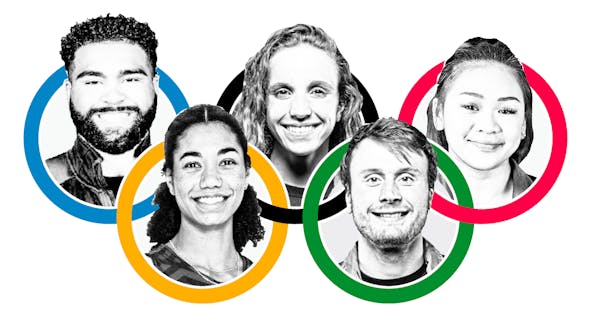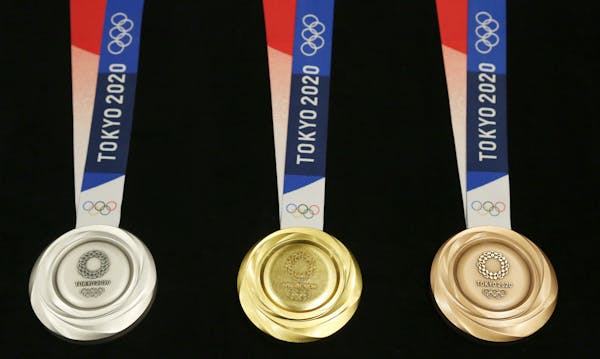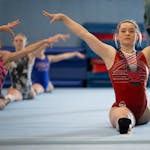TOKYO — Shane Wiskus won't be bringing an Olympic medal back to Minnesota. The U.S. men's gymnastics team finished fifth in Monday's team finals at the Tokyo Games, the last competition for the former Gopher at his first Olympics.
He still got something wonderful to take home. After Russia won the gold, Wiskus stood in the middle of the floor at Ariake Gymnastics Centre and looked around the arena, locking the scene into his memory.
"I was just trying to soak everything in,'' Wiskus said. "I was just standing there as long as I could, really absorbing the atmosphere and enjoying that last moment.''
His teammates felt the same way, even though the U.S. men logged their third consecutive fifth-place finish at the Summer Games. A longshot to make the podium in Tokyo, they are not as technically advanced as Russia, Japan and China, who collected the gold, silver and bronze.
“It was an amazing experience. I felt like I did my part to help the team as much as I could. I'm extremely grateful for this opportunity, and very hungry to return to the next Games.”
Those three nations waged a thrilling battle, with Russia taking the crown on its final routine. Led by reigning world all-around champion Nikita Nagornyy, the Russians surged to a three-point lead after the fourth rotation. China cut the margin to 0.640 going into the final rotation, with Japan also within striking distance.
Daiki Hashimoto nailed his high bar routine to vault Japan into the lead, but Nagornyy had the last word. His action-packed floor exercise routine gave Russia a total score of 262.500, beating Japan by 0.103 of a point for its first Olympic team gold since 1996.
The Americans were fourth with one event to go. They faltered on floor exercise and finished with a total score of 254.594, behind Great Britain's 255.760. To three-time Olympian Sam Mikulak, competing in his final Games, the overall experience was more important than the final placement.
"We went out there with a lot of fight, a lot of heart, and handled a lot of tough pressure situations,'' Mikulak said. "No one else made any mistakes, so it didn't really open the door for us to slide in there.
"We're just happy we had a great showing. We had fun through this whole process. That's more than you can ask for.''
Mikulak said the U.S. "knew what it was up against'' in the three top countries. Scores from Saturday's qualifying round did not carry over to the finals, but they showed the Americans how much of a gap they needed to close to get on the podium. While only 0.036 of a point separated first-place Japan from third-place Russia, the U.S. trailed the Russians by 5.184 points.
The U.S. men have not won an Olympic medal in team competition since 2008, when they took bronze, and had a pair of fourth-place finishes at the two most recent world championships. The pandemic hampered their efforts to catch up.
Brett McClure, USA Gymnastics high performance director for the men's program, said Russia, China and Japan immediately created team bubbles to train uninterrupted when COVID-19 shutdowns began. In the U.S., many athletes found themselves with no place to train for extended periods when gyms, universities and other facilities closed.
The Americans came into the Olympics simply looking to do their best. Wiskus competed on four of six events in the final and scored a team-high 14.166 on rings. In the fourth rotation, his outstanding parallel bars routine helped boost the U.S. from sixth place to fourth.
When they got to floor exercise, it was unlikely they would earn a medal, but they didn't relax. "Even on the last rotation, we were going big,'' Wiskus said. "You treat every routine as if it's for a gold medal.''
Yul Moldauer started the Americans off with a 14.366, followed by Wiskus' 13.466. Mikulak struggled with his routine, with one fall and some shaky landings.
Several members of the U.S. team have more competition left. Mikulak and Brody Malone are in Wednesday's all-around finals. Individual event finalists include Mikulak (parallel bars), Malone (high bar), Moldauer (floor exercise) and Alec Yoder (pommel horse).
Mikulak will retire after the Games, but he hopes to see his teammates push the U.S. closer to an Olympic medal in the future. As for Wiskus, he hopes to return to the Olympics in 2024, to stand on another competition floor and bask in the moment.
"It was an amazing experience,'' he said. "I felt like I did my part to help the team as much as I could. I'm extremely grateful for this opportunity, and very hungry to return to the next Games.''





